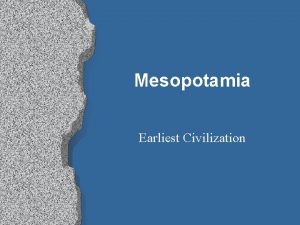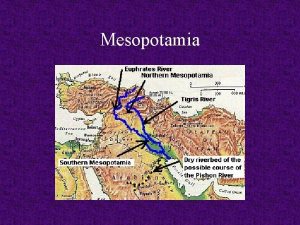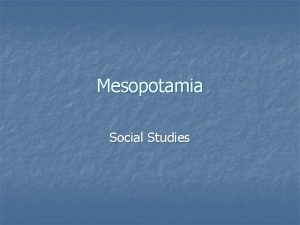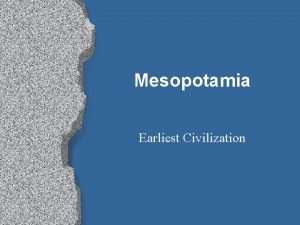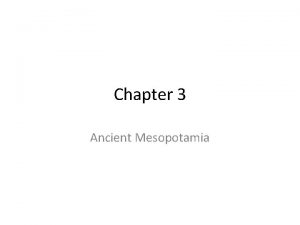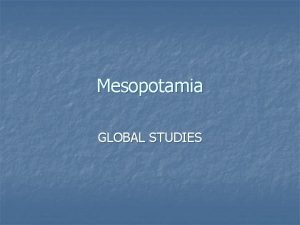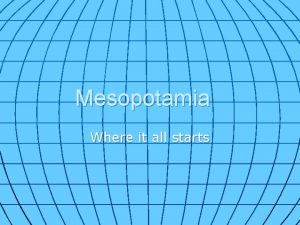Modern Mesopotamia Mesopotamia n n The oldest of














- Slides: 14

Modern Mesopotamia

Mesopotamia n n The oldest of all civilizations Land between the two rivers (The Tigris and Euphrates Rivers) BUT = land between the rivers was inhospitable. Sudden flooding could cause death. It was in this area that humans first gave up their nomadic lifestyle and settled down into permanent settlements.

Mesopotamia n It stretches northwest from the Persian gulf to Baghdad n North (Sumer) n South (Akkad) n The two regions are also known as Babylonia

Geography of Mesopotamia n n n Land: Alluvial Plain Low rainfall Climate is hot and dry No minerals No trees/stone for building Why would anyone live here?

Mesopotamia “The People” Mesopotamian civilization was the result of the mixture of 3 distinct groups n 1. Summerians – developed writing, language, first cities n 2. Assyrians – Fighters n Babylonians – scribe, Hummarabi laws n

Levees Occur along the banks of the Euphrates n Natural levees are the result of thousands of years of flooding which deposits sediment along the bank n These levees are highest next to the river and slope gently away n

Sumer (Sumar)

Sumerian Society 2900 -2400 BC The Sumerians were the first civilization to occupy the Tigris. Euphrates river valley called the Mesopotamia n Each of their separate city-states had its own ziggurat, which contained governmental offices as well as a temple. The temple was located on the highest platform (now eroded in the example). n Since the Mesopotamia had no geographical barriers, it was open to attack from other developing civilizations. Thus, its history is one of continual invasions. With each successive ruler, new artistic influences were absorbed. n

The Assyrians n n When the Assyrians conquered the Babylonians in the 9 th century B. C. E. , they erected citadels to protect their temples and palaces from further invasions. On the huge stone walls were carvings depiting winged deities, which was emblematic of the power of their king. At the entrance to the citadel of Nimrud were a pair of winged bulls. The face is believed to be a portrait of the king, Ashurnasirpal II. His cap indicates his divine status. There is an interesting peculiarity about this statue: They felt it was necessary that both front legs were visible on approaching it, but also wanted it to appear as if it was walking when viewed from the side. This problem permitted them to make a compromise by giving the creature 5 legs.

Writing Mesopotamians invented writing around 3500 BC. Their writing was called cuneiform. It was done by pressing a stylus into soft clay. n It represented a shift from pictograms to ideograms. The symbols represented ideas n

The Babylonian Empire


The Babylonians Hammurabi reigned Mesopotamia between 1792 and 1750 B. C. E. His code of laws was probably the first written rule of conduct governing property rights, financial transactions, and domestic matters. n At the top of the stele, Hammurabi is shown, receiving divine inspiration from the sun-god - who sits on his heavenly throne, with light rays radiating off of his shoulders. Below this is a complex inscription of laws. Its entire height is 7'4", though only the top portion is pictured here n Lasting impact was his law code: where the “eye for an eye” concept comes from here. n

 đại từ thay thế
đại từ thay thế Thế nào là hệ số cao nhất
Thế nào là hệ số cao nhất Diễn thế sinh thái là
Diễn thế sinh thái là Vẽ hình chiếu vuông góc của vật thể sau
Vẽ hình chiếu vuông góc của vật thể sau Lp html
Lp html Thế nào là mạng điện lắp đặt kiểu nổi
Thế nào là mạng điện lắp đặt kiểu nổi Cách giải mật thư tọa độ
Cách giải mật thư tọa độ Lời thề hippocrates
Lời thề hippocrates Vẽ hình chiếu đứng bằng cạnh của vật thể
Vẽ hình chiếu đứng bằng cạnh của vật thể Chụp tư thế worms-breton
Chụp tư thế worms-breton Quá trình desamine hóa có thể tạo ra
Quá trình desamine hóa có thể tạo ra Khi nào hổ mẹ dạy hổ con săn mồi
Khi nào hổ mẹ dạy hổ con săn mồi Dạng đột biến một nhiễm là
Dạng đột biến một nhiễm là điện thế nghỉ
điện thế nghỉ Các châu lục và đại dương trên thế giới
Các châu lục và đại dương trên thế giới















